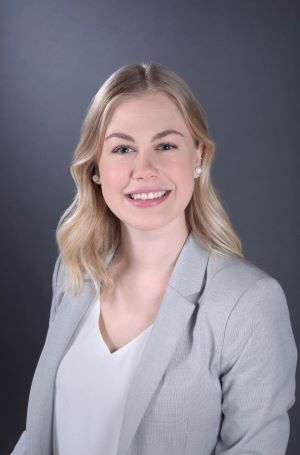
Alexa Saleski -- A Lifelong Learner
“When people ask me what I want to be in the future, I generally respond, ‘A lifelong learner.’”
By Brooke KleiboerAlexa Saleski is a fourth-year undergraduate student pursuing a Bachelor of Commerce honours degree in the Edwards School of Business, majoring in human resources. Her honours project is being conducted with the guidance of Dr. Erica Carleton and Dr. Megan Walsh, investigating gendered leadership and predictors of passion for leadership in organizations.
Discovering a passion for knowledge
When Alexa began her degree at the University of Saskatchewan, joining a research team and developing new knowledge in the field of human resources was not on her radar.
“When I entered human resources, I had limited knowledge about the organizational behavior aspects of the discipline,” she says. “In taking courses about leadership and women’s and gender studies throughout my degree, I realized my fascination with specific topics, especially the different forms of leadership and the unique obstacles that women face in a professional setting.”
When she discovered her passion for business, social sciences and human behavior, Alexa began to seek opportunities “to understand and analyze the behaviors of leaders and coworkers in an organizational setting.” She found this opportunity when taking a class about leadership with Dr. Erica Carleton in the Edwards School of Business.
“After completing a leadership course, the professor, Erica Carleton, approached me to see if I would be interested in completing an honours project alongside her and Megan Walsh,” Alexa says. “This opportunity presented a unique learning experience to push myself and explore more of my interests.”
“My current research focus is gendered leadership and how stereotype threats can predict passion for leadership with a mediator of anxiety. Having had several opportunities to work in business settings I can see firsthand how much of this topic actually plays out in a functioning organization.”
Finding a voice in the research world
When approached about undertaking an honours project, Alexa wasn’t sure of her fit in the research world and the requirements of being an honours degree candidate.
“Completing research offers a much more hands-on experience, allowing me to take responsibility for my learning and choose a topic that is interesting to me,” she says. “Completing an honours project takes the place of a class on your transcript, but in my opinion, it is a much more enriching experience than an average class.”
“Having the opportunity to look into topics I am interested in such as leadership, organizational behaviour and gender inequality through the lens of theory, data and academic research presented a new challenge and perspective that excited me.”
Professional Development
Besides pursuing her goal of lifelong learning and putting a focus on underexamined topics in the field of organizational behavior, Alexa also got the chance to develop a relationship with the faculty members involved in her honours project. Developing relationships with knowledgeable professors and the larger research team has been rewarding both professionally and personally.
“Be willing to learn, express your ideas and ask questions,” she says. “This is how you will grow; the professor you are working with was once in your place.”
Lessons learned from working in the field
Alexa comes from the world of business research, which often doesn’t receive the same amount of attention as scientific research. She wants to ensure that her fellow Edwards School of Business students and other undergraduates know about the multiple types of research that exist in fields such as the social sciences. It can sometimes be hard to see the opportunities right in front of you as a student.
Most professors and other faculty members conduct research as a central portion of their role as faculty in a research-intensive university, but those research activities are not always obvious or presented to students during course work. Because of this gap, undergraduate research opportunities can be hidden, or students may not recognize that they do not need to be a graduate student to generate knowledge for their own fields.
When asked what other undergraduate students can do to seek out research opportunities in their areas of interest as they work towards their degrees, Alexa urges others to take advantage of any opportunities: honours projects, capstone classes, and seeking out faculty members to ask if you can join their research team.
She offers undergraduate students the following wisdom for finding their own voice in the world of research: “Reach out to professors and express your interest. Do not be afraid of the challenge or whether you are the ‘perfect’ candidate. We all have different areas of strength.”

